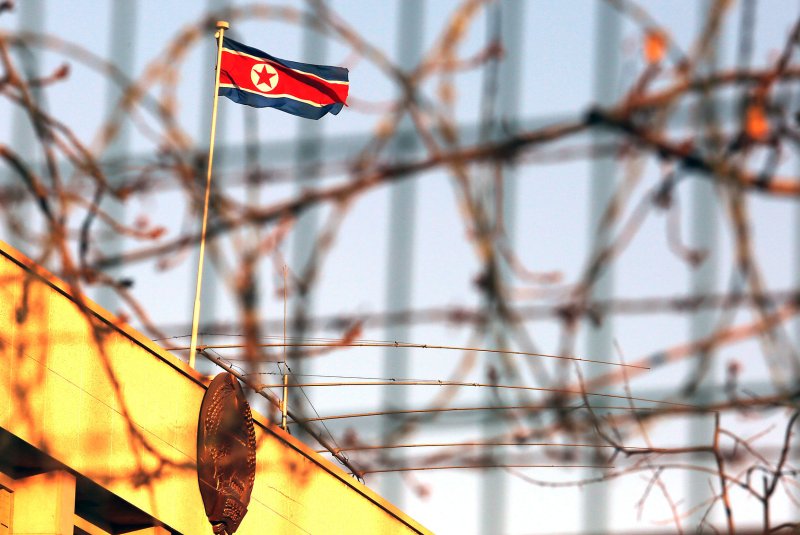The North Korean flag flies over its embassy in Beijing, China, on January 6, 2016. Tuesday, the U.S. House of Representatives voted to toughen sanctions against the communist regime that would block Pyongyang's access to currency and place economic restrictions against people and entities that are believed to be contributors to North Korea's weapons proliferation. Photo by Stephen Shaver/UPI |
License Photo
WASHINGTON, Jan. 12 (UPI) -- The U.S. House of Representatives on Tuesday cast a near-unanimous vote to enhance economic sanctions against the North Korean government after its reported test of a nuclear weapon this month.
The 418-to-2 vote enhances economic sanctions against the communist state, which last week claimed it test-detonated a hydrogen bomb -- one of the most powerful weapons in existence.
Among other things, the legislation seeks to block North Korea's access to currency and imposes sanctions on mostly financial entities and individuals that aid Pyongyang in its weapons proliferation.
"The idea is that if you can force financial institutions into a choice between transacting with North Korea or transacting with the United States, they will all choose the latter and leave North Korea out in the cold," former Obama administration adviser Adam Smith said.
Under the legislation, any sanctioned party would not be allowed to enter the United States and any party to that end would be barred from entering into labor contracts with the federal government.
"Congress must send the message to the Kim regime that they can either reform and disarm or the system can implode," House Foreign Affairs Committee Chairman Ed Royce, R-Calif., the bill's sponsor, said. "Without hard currency, without being able to pay the generals, that system would implode."
The United Nations is also considering additional sanctions against Pyongyang.
The only two nay votes came from Reps. Justin Amash, R-Mich., and Thomas Massie, R-Ky.
Pyongyang claimed last week that it had successfully tested a hydrogen bomb, which would be a violation of U.N. Security Council resolutions. Several foreign nations, however, including the United States, have expressed skepticism of that claim.
"We cannot allow North Korea to continue to be dangerous and frivolous," Rep. Eliot Engel, D-N.Y., the top Democrat on the House Foreign Affairs Committee, said. "They have to understand that we mean business."
"The latest test demands a response," he said Monday. "North Korea has become more and more savvy at evading sanctions and that is why this bill broadens our sanctions."
The Senate is expected to vote on similar legislation in the next few weeks.
Some lawmakers have joined the ongoing concern about North Korea with existing concerns about a nuclear Iran -- and the landmark accord struck last summer between Tehran and Western powers.
The House is set to vote Wednesday on a different piece of legislation that would prevent the Obama administration from lifting sanctions against people or entities in Iran if they contribute in any manner to terrorism, state-sponsored or independent.















